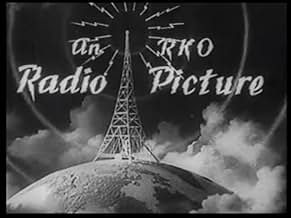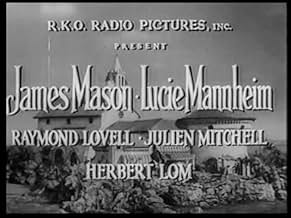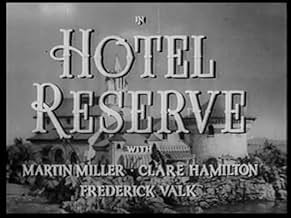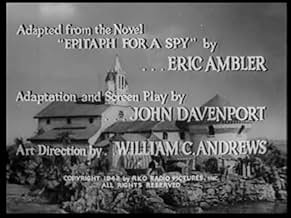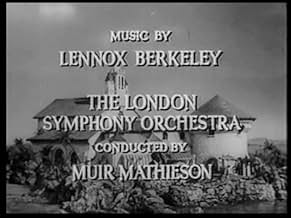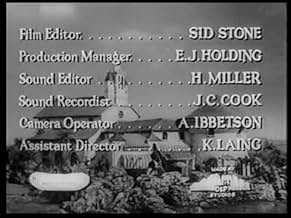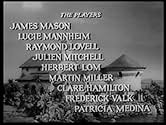A hunt for a spy, in an hotel in the South of France just before World War Two.A hunt for a spy, in an hotel in the South of France just before World War Two.A hunt for a spy, in an hotel in the South of France just before World War Two.
- Directors
- Writers
- Stars
Joseph Almas
- Albert, the waiter
- (as Josef Almas)
Hella Kürty
- Hilda Vogel
- (as Hella Kurty)
- Directors
- Writers
- All cast & crew
- Production, box office & more at IMDbPro
Featured reviews
James Mason, refugee from what was formerly Austria is now at a resort hotel
on the French Riviera when he's picked up as a spy. Of course he's not our
spy, however he's let go by the authorities and put under essentially house
arrest at the hotel. Someone switched cameras there on him and he'd like to
find out who is a real spy at the hotel.
He's got quite a few choices. Some he'd like not to think of as a spy others look like they could have come from central casting as sneaky and spy like. As a detective he's not very good and it is fortunate the authorities do have the situation closely monitored.
The object of all this is the French naval base at Toulon. It's been the home of their Mediterranean fleet since the middle ages. Still is.
The film is based on a novel by Eric Ambler and Mason himself didn't feel it was something that belonged in his best work. Still he's not bad as the Eric Ambler protagonist in this film.
He's got quite a few choices. Some he'd like not to think of as a spy others look like they could have come from central casting as sneaky and spy like. As a detective he's not very good and it is fortunate the authorities do have the situation closely monitored.
The object of all this is the French naval base at Toulon. It's been the home of their Mediterranean fleet since the middle ages. Still is.
The film is based on a novel by Eric Ambler and Mason himself didn't feel it was something that belonged in his best work. Still he's not bad as the Eric Ambler protagonist in this film.
Propaganda plays a key role in modern warfare, so between 1939 and 1945 the British cinema made an important contribution towards our war effort. Although "Hotel Reserve" is set during the pre-war period, it can nevertheless be regarded as a propaganda film as it is a spy thriller in which the Nazis are the villains and the good guys, apart from the French intelligence services, are Austrian and German anti-Nazi émigrés.
In the summer of 1938 Peter Vadassy, a young Austrian medical student studying in France, is on holiday at the Hotel Reserve in the south of France. Being a keen photographer, he takes a number of photographs and then takes the negatives to the local pharmacy to have them developed. When he tries to collect the prints, however, he is arrested by French intelligence. It turns out that some of the photographs are of the French naval base at Toulon. Michel Beguin, the intelligence officer who interrogates Peter, realises that he is not a spy, but nevertheless sends him back to the hotel with instructions to find the real culprit, under threat of expulsion from France. This would mean Peter's having to abandon his medical studies and, as he is opposed to the Nazi regime, has no desire to return to Austria. (Contrary to what is argued in the "goofs" section, the year must be 1938, not 1937).
As others have pointed out, the plot of "Hotel Reserve"- an innocent man caught up in international espionage- could be that of an Alfred Hitchcock film. It was one he used in, among others, the two versions of "The Man who Knew Too Much" and "North by North-West". (James Mason, who appears as Peter here, also appeared in "North by North-West", his only collaboration with Hitchcock, although in that case as the film's villain rather than its hero). By 1944, however, Hitch had left Britain for Hollywood, so was not available. The film was both directed and produced by a trio: Lance Comfort, Mutz Greenbaum (aka Max Greene) and Victor Hanbury.
It is interesting to speculate what the film might have looked like had Hitchcock directed it. There would probably have been a more prominent leading role for Peter's love-interest Mary, who would doubtless have been played by a blonde. Hitch would also probably have maintained a greater level of suspense throughout; in the film as it exists the tension tends to slacken in the middle, although there is a very tense (and very Hitchcockian) final scene involving a rooftop cliff-hanger. This is a decent, but not outstanding, spy thriller, and mason made many better films in his long and distinguished career, but in 1944 it was doubtless appreciated. 6/10.
In the summer of 1938 Peter Vadassy, a young Austrian medical student studying in France, is on holiday at the Hotel Reserve in the south of France. Being a keen photographer, he takes a number of photographs and then takes the negatives to the local pharmacy to have them developed. When he tries to collect the prints, however, he is arrested by French intelligence. It turns out that some of the photographs are of the French naval base at Toulon. Michel Beguin, the intelligence officer who interrogates Peter, realises that he is not a spy, but nevertheless sends him back to the hotel with instructions to find the real culprit, under threat of expulsion from France. This would mean Peter's having to abandon his medical studies and, as he is opposed to the Nazi regime, has no desire to return to Austria. (Contrary to what is argued in the "goofs" section, the year must be 1938, not 1937).
As others have pointed out, the plot of "Hotel Reserve"- an innocent man caught up in international espionage- could be that of an Alfred Hitchcock film. It was one he used in, among others, the two versions of "The Man who Knew Too Much" and "North by North-West". (James Mason, who appears as Peter here, also appeared in "North by North-West", his only collaboration with Hitchcock, although in that case as the film's villain rather than its hero). By 1944, however, Hitch had left Britain for Hollywood, so was not available. The film was both directed and produced by a trio: Lance Comfort, Mutz Greenbaum (aka Max Greene) and Victor Hanbury.
It is interesting to speculate what the film might have looked like had Hitchcock directed it. There would probably have been a more prominent leading role for Peter's love-interest Mary, who would doubtless have been played by a blonde. Hitch would also probably have maintained a greater level of suspense throughout; in the film as it exists the tension tends to slacken in the middle, although there is a very tense (and very Hitchcockian) final scene involving a rooftop cliff-hanger. This is a decent, but not outstanding, spy thriller, and mason made many better films in his long and distinguished career, but in 1944 it was doubtless appreciated. 6/10.
JAMES MASON finds himself in a very Alfred Hitchcock situation in HOTEL RESERVE, that of an innocent man suspected of being a spy and having to prove his innocence by cooperating with the authorities to nab the real espionage agent. Sound familiar? Hitchcock used the same sort of innocent man frame-up in many films, most notably NORTH BY NORTHWEST.
But what's missing here, as others have commented, is that Hitch's expert touch is missing from the direction. The plot even has an exciting ending where hero and villain are atop a tall building and we know which one is going to meet his demise--but it's rather well done, except that Hitchcock would have thrown in some added touches for an even tighter bit of suspense.
Mason is very good in the leading role as the man caught in what appears to be a trap, while staying at the Hotel Reserve, where he must survey all the other guests to determine which one may have gotten their hands on his camera by mistake. The plot never becomes too overburdened with subplots (as some of these thrillers do), so it's all told in a brief hour and nineteen minutes.
HERBERT LOM is effectively cast as the hot-headed villain, with PATRICIA MEDINA not having much to do as his docile wife, and LUCIE MANNHEIM makes almost no impression at all as Mason's love interest, providing little more than a pretty face and a blank stare.
The improbable entrapment of the killer by police is a minor quibble, as is his method of temporary escape--but other than that, it's an acceptable spy thriller.
Summing up: Taut and tense with occasional bits of humor, it establishes why James Mason became a favorite with British and American audiences.
But what's missing here, as others have commented, is that Hitch's expert touch is missing from the direction. The plot even has an exciting ending where hero and villain are atop a tall building and we know which one is going to meet his demise--but it's rather well done, except that Hitchcock would have thrown in some added touches for an even tighter bit of suspense.
Mason is very good in the leading role as the man caught in what appears to be a trap, while staying at the Hotel Reserve, where he must survey all the other guests to determine which one may have gotten their hands on his camera by mistake. The plot never becomes too overburdened with subplots (as some of these thrillers do), so it's all told in a brief hour and nineteen minutes.
HERBERT LOM is effectively cast as the hot-headed villain, with PATRICIA MEDINA not having much to do as his docile wife, and LUCIE MANNHEIM makes almost no impression at all as Mason's love interest, providing little more than a pretty face and a blank stare.
The improbable entrapment of the killer by police is a minor quibble, as is his method of temporary escape--but other than that, it's an acceptable spy thriller.
Summing up: Taut and tense with occasional bits of humor, it establishes why James Mason became a favorite with British and American audiences.
"Hotel Reserve", a spy movie from the '40s, is thoroughly enjoyable, though it does have its faults.
The story deals with a vacationing medical student (a very young and good-looking James Mason) who is mistaken for an enemy spy by the French police. Realizing he is innocent, the police department send him back to his hotel with the mission of finding out which of the guests is really the spy.
Though a good film, the supporting cast is weak. Mr Mason is at his usual elegant standard, and I must say that I love the guy playing Duclos, but many of the other parts could have been better filled. I agree that it would have been interesting to see what Hitch would have done with it, but Alfred or no Alfred, "Hotel Reserve" is still very much worth seeing.
The story deals with a vacationing medical student (a very young and good-looking James Mason) who is mistaken for an enemy spy by the French police. Realizing he is innocent, the police department send him back to his hotel with the mission of finding out which of the guests is really the spy.
Though a good film, the supporting cast is weak. Mr Mason is at his usual elegant standard, and I must say that I love the guy playing Duclos, but many of the other parts could have been better filled. I agree that it would have been interesting to see what Hitch would have done with it, but Alfred or no Alfred, "Hotel Reserve" is still very much worth seeing.
Looks like RKO had a British productions unit that would explain the non-American cast, and perhaps also why the unusual number of three directors was used on a black and white programmer. Some of the sets are impressive, especially the tower used in the final scene. Also, Frederick Valt impresses as the sinister Schimler, along with a sparkling Clare Hamilton who's a dead ringer for her sister Maureen O'Hara and apparently just as talented; yet, this is her only screen appearance and I'm curious why.
Nonetheless, in my little book, the movie disappoints, mainly because it's set up as a suspense film, yet doesn't really manage much suspense. We're introduced to each of ten suspects, one of which is a Nazi agent. Ordinarily, the narrative would develop each so that the audience could sort through them, thereby heightening the suspense. That doesn't happen here. Instead, much time is given over to two unnecessarily long scenes with the intelligence chief and repeated episodes with the pompous Duclos who's really more annoying than amusing. In fact, the narrative meanders to the extent few suspects are developed, and when the agent is revealed, it's done in highly unsuspenseful, pedestrian fashion. The various parts simply don't gel, and I suspect it's due not only to a muddled adaptation of the Ambler novel, but also to each director having his own preoccupations.
It's also a different James Mason. Not the dark, brooding presence he is so good at. Instead, he's rather sunny and serene, even in tight spots. Frankly, his performance here could have been equaled by a dozen lesser actors and leading men. The movie does have its moments, particularly the seaside setting with the moody resort hotel. That, plus the premise of ten suspects, had me thinking of the 1945 Rene Clair mystery classic And Then There Were None. Unfortunately, the result here likely demonstrates that old adage about too many cooks.
Nonetheless, in my little book, the movie disappoints, mainly because it's set up as a suspense film, yet doesn't really manage much suspense. We're introduced to each of ten suspects, one of which is a Nazi agent. Ordinarily, the narrative would develop each so that the audience could sort through them, thereby heightening the suspense. That doesn't happen here. Instead, much time is given over to two unnecessarily long scenes with the intelligence chief and repeated episodes with the pompous Duclos who's really more annoying than amusing. In fact, the narrative meanders to the extent few suspects are developed, and when the agent is revealed, it's done in highly unsuspenseful, pedestrian fashion. The various parts simply don't gel, and I suspect it's due not only to a muddled adaptation of the Ambler novel, but also to each director having his own preoccupations.
It's also a different James Mason. Not the dark, brooding presence he is so good at. Instead, he's rather sunny and serene, even in tight spots. Frankly, his performance here could have been equaled by a dozen lesser actors and leading men. The movie does have its moments, particularly the seaside setting with the moody resort hotel. That, plus the premise of ten suspects, had me thinking of the 1945 Rene Clair mystery classic And Then There Were None. Unfortunately, the result here likely demonstrates that old adage about too many cooks.
Did you know
- TriviaClare Hamilton, who plays Mary Skelton, was the sister of Maureen O' Hara. This would be her one and only screen appearance.
- GoofsAll online summaries of the plot identify the year being 1938, but days and dates seen on the calendar in Peter's room are only correct if the year is 1937. Whoever wrote the original synopses for this film apparently knows no French.
- Quotes
[last lines]
Mme Suzanne Koch: Let them be happy, while they can. There are so few summers. There's so little time.
- Crazy creditsOpening credits prologue: A holiday...in France...before the war...yet even then the plane-trees and cypresses of the South cast shadows in the sun.
It happened in August 1938 ...
- ConnectionsRemade as Epitaph for a Spy (1953)
Details
- Release date
- Country of origin
- Language
- Also known as
- El espía del hotel
- Filming locations
- D&P Studios, Denham, Uxbridge, Buckinghamshire, England, UK(studio: made at)
- Production company
- See more company credits at IMDbPro
- Runtime1 hour 30 minutes
- Color
- Aspect ratio
- 1.37 : 1
Contribute to this page
Suggest an edit or add missing content


